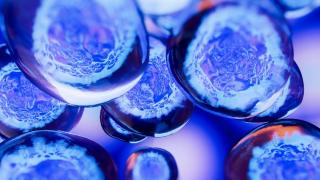It can start with any number of symptoms — unquenchable thirst, constant bathroom trips, a lingering run-down feeling or weight dropping off for no apparent reason. In extreme cases, people even vomit or suddenly collapse.
No matter what type 1 diabetes looks like at its onset, one thing is sure. The symptoms signal that the disease has damaged the body.
But what if things didn’t have to be that way? That’s the vision of analytical chemist Sarah Shuck , Ph.D. She and her team search diligently for ways to detect type 1 diabetes and the kidney disease it can cause — before the damage is done.
“The problem is that by the time the disease presents clinically, there are very few ways to stop it from progressing,” said Shuck, assistant research professor of molecular medicine at City of Hope. “Our work is focused on analyzing components that are produced at the very earliest stages of type 1 diabetes and diabetic kidney disease, to try and identify the people who are most vulnerable.”
In City of Hope’s collaborative environment, her mission is to turn her research findings into a functional screening that could head type 1 diabetes and kidney complications off at the pass.
Science on the Path to Early Detection
The potential telltale compounds that Shuck studies are advanced glycation end products, which result when biologically essential molecules such as proteins and DNA are chemically modified by excess sugar. These end products impair function in the body and accumulate to cause the suffering seen in type 1 diabetes.
Shuck’s team roots out molecular suspects by combing through research repositories from clinical trials that include samples taken before diagnosis. With an eye toward eventual clinical application, Shuck and her colleagues zero in on substances that could be detected in a simple urine test. Recent research has yielded promising candidates.
In addition, her investigations may help elucidate the connections between diabetes and cancer. The two diseases have a multilayered relationship — such as diabetes increasing risk for certain cancers — but the underlying mechanisms remain poorly understood.
“We discovered pretty early on that these biomarkers we’re measuring are at the interface between cancer and diabetes,” Shuck said. “We’re trying to understand how metabolism might be a link between the two.”
Her investigations benefit from the atmosphere of prolific, easy collaboration at City of Hope. She has teamed up with faculty at the Diabetes & Metabolism Research Institute at City of Hope such as Debbie Thurmond, Ph.D., Ruth B. & Robert K. Lanman Chair in Gene Regulation & Drug Discovery Research and director of the institute and Rama Natarajan, Ph.D., National Business Products Industry Chair in Diabetes Research.
“I always seem to find someone at City of Hope who can help me investigate the scientific questions I’m interested in,” Shuck said. “The ability to collaborate with world-class researchers has really been a game-changer in our work.
“And without the access to large clinical cohorts that our collaborations at City of Hope have helped us establish, we wouldn’t be in a position to do the research we’re doing today.”
Inspiration From Her Roots
Growing up in working-class Martinsville, Indiana, Shuck harbored ambitions of becoming a physician. While her future career would contribute to human health in a different way, that path was obscure at the time.
“I was fascinated by understanding how the body works, but I never even knew that being a scientist was a job,” she said.
A first-generation college student, Shuck completed a biology degree at Indiana University Bloomington on the pre-med track. Her plan was to pick up a master’s degree in cellular and integrative physiology before her medical education. The experience opened her eyes to new possibilities.
“I became fascinated with the biochemistry of how diseases develop, and I realized that that was what I really wanted to pursue,” Shuck said. “I feel like being a scientist is the best job because you basically get to ask questions all day, which to me is the most fun thing in the world.”
She earned a doctoral degree in biochemistry and molecular biology from Indiana University then did postdoctoral work at Vanderbilt University. She reached another key turning point in 2015 when she contacted mentor-to-be John Termini, Ph.D., professor of molecular medicine at City of Hope, after meeting him at a scientific conference.
“The work he was doing was exactly what I was looking for,” Shuck said. “Coming to work for him completely changed my career trajectory, and he gave me the opportunity to build my own research program.”
Ultimately, part of her motivation to translate science into impact is intertwined with her roots in Martinsville. There, she saw friends and family members afflicted by chronic disease that shortens people’s lives.
“People tend not to seek health care until their disease has progressed significantly, and by that time it’s way too late,” she said. “Our studies are a direct reflection of that. One way to make sure that these health interventions are available to everyone is to offer testing that gives an early warning when things are going wrong.”

